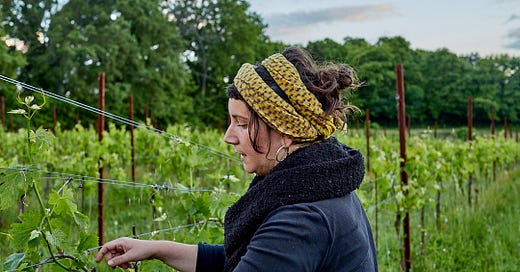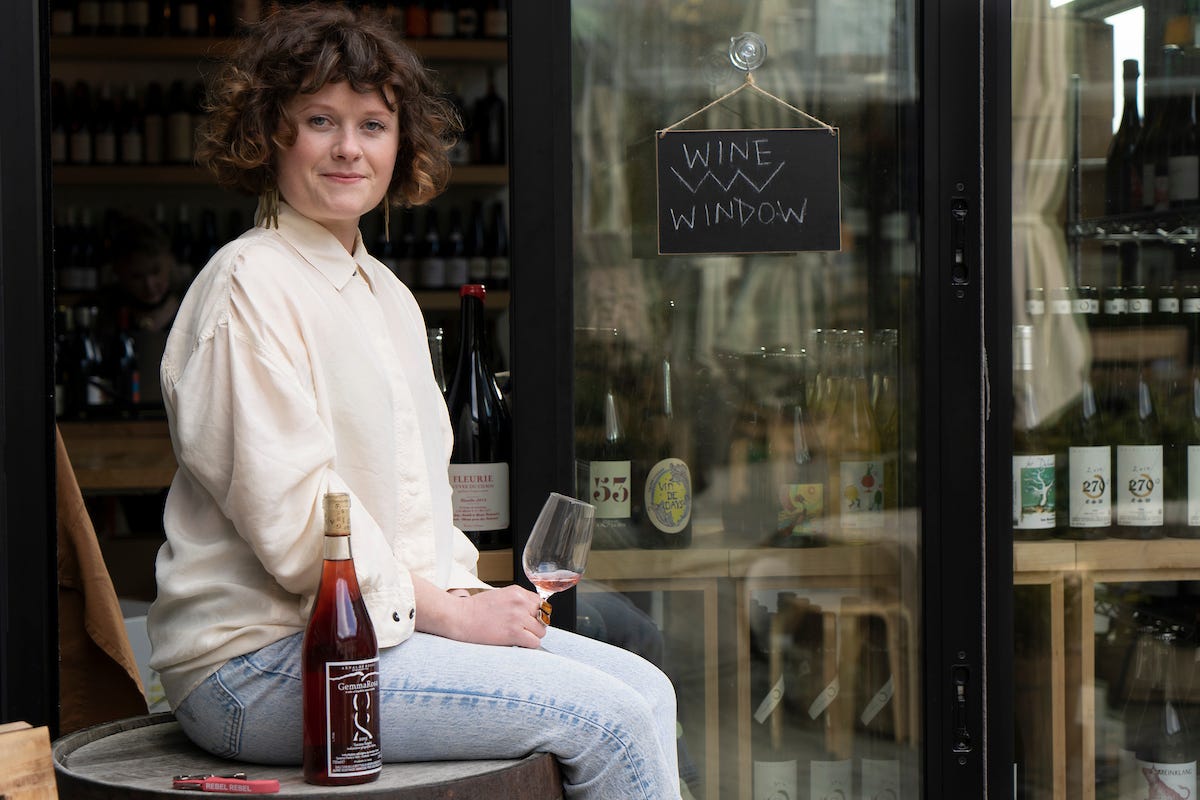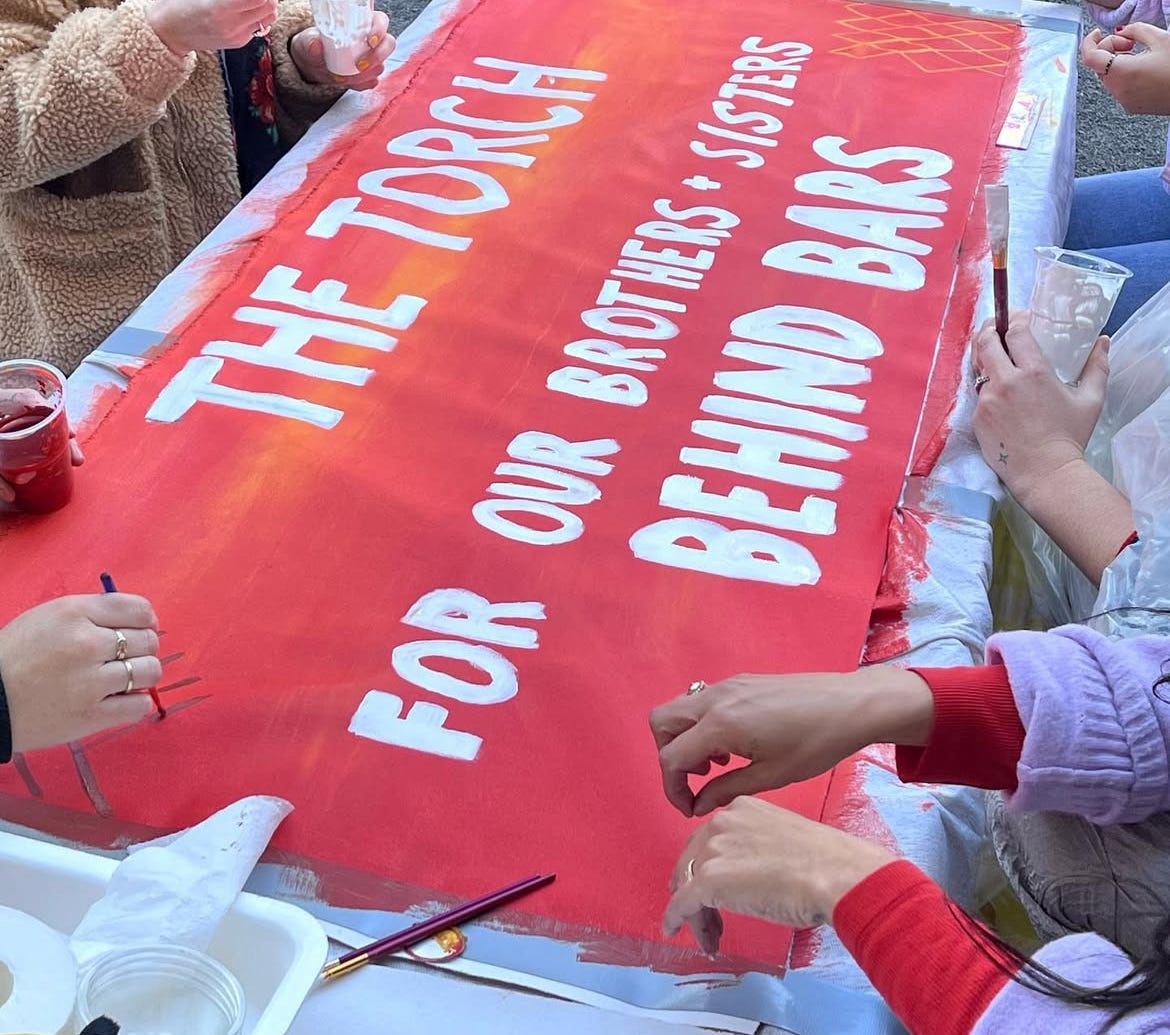In the ebbs and flows of each humanitarian crisis, those of us who work in the lifestyle space sometimes throw up our hands and renounce our profession. It can seem flighty and superfluous to be explaining about sulfur additions when the news cycle is one human-made disaster after another.
But natural wine is political. Its origins are political, and it continues to be to this day. In this week’s newsletter, I’m highlighting seven ways that the global natural wine community reinforces its position as underdog fighting for a better world.
1. Anti-Patriarchy Label Art
Farmer, wine distributor, and visionary Fleur Godart, based out of Paris, launched Putes Feministes (“feminist sluts”) a few years ago to highlight the collective oppression of women and minorities. With custom brightly-toned, catchy labels on bottlings from French vignerons like Domaine du Temps Retrouvé, the wines exploit slurs that women and minorities have experienced being hurled in their faces and promote concepts like self-love in a revolutionary way. Some reference the #MeToo movement. This line eventually expanded to a broader range called Cuvée Militants (“activist wine”). Fleur is also opening a pantry + wine shop in Saint-Ouen for any Parisian readers or visitors to the city who want to support her liquid activism.
2. Wine Sales Funding Social Needs
At the entrance to Rebel Rebel in Somerville, Massachusetts, is a sign that reads “Abortion access is a community responsibility.” Within three years of opening Rebel Rebel, owner Lauren Friel had sold mulled organic wine as a fundraiser to help people in Texas recover from a devastating snowstorm; sold rosé to raise funds for abortion access and for Black Lives Matter groups; and been a hub for donations for undocumented workers during the pandemic.
Friel told journalist Meg Bernard, writing for Pipette Issue 9: “Natural wine is super political. Everything is political, to me anyway. Natural wine is talking about the environment. Natural wine is talking about deconstructing systems of gatekeeping both for producers and wine professionals on the service side of things.” If you’re ever in Boston or Somerville, don’t miss Rebel Rebel and its James Beard-nominated wine program.
3. Supporting Vineyard Workers
It’s well-known that the American wine industry in particular would collapse without the dedicated work of first-or-second-generation arrivals from elsewhere. It’s also no secret that those workers, like many Americans, don’t have access to reliable health care. Salud! in Oregon hosts an annual wine auction that funds compassionate and individualized health care for vineyard workers.
A few of the participating wineries, like Soter, farm biodynamically, showing an even deeper concern for the health of their workers by not exposing them to harsh chemicals. Salud! accepts donations. Ahivoy is another Oregon organization supporting vineyard workers.
4. A Space for Gathering
One of my favorite wine bars in Australia, Hope St. Radio in Melbourne/Naarm, hosts a sign-painting and march-going session every year on “Invasion Day,” which is the response to the very unfortunate federally-imposed practice of observing the day Australia’s brutal colonization began. They also paint signs for NAIDOC week, a nationwide web of events organized by the National Aboriginal and Islanders Day Observance Committee, making it into a chance to call attention to the ongoing oppression of indigenous people in so-called Australia. Hope St. Radio seamlessly weaves their activism into dialogue about natural wine and music, never questioning whether they belong together.
5. Challenging Eurocentricism in Wine
One of the forthcoming books I’m most excited about is Cha McCoy’s Wine Pairing for the People: The Communion of Wine, Food, and Culture from Africa and Beyond. Too often, we hear about wine pairings in terms of European-style cuisines, and in this book, Cha McCoy brings wine into conversation with foods from Africa, Asia, and beyond. Many of us have long known the ecstasy of a glass of lush, aromatic white wine alongside Pad Thai—but unfortunately, the wine world often does need a reminder that there are a diversity of palates out there, thirsty for fresh discourse and ideas.
Cha’s book is sure to be a hit—you can pre-order it now via the link above. And check out my interview with Cha here for more background on her career.
6. Celebrating Palestinian Wines
The Levant is probably the birthplace of vitis vinifera (the common grapevine) and has an ancient winemaking history. Writing for Wine Enthusiast, journalist Hannah Bakshi profiles Philokalia, a West Bank wine label fermenting indigenous grapes in amphorae. Winemaker Sari Khoury describes how his vines were “crushed under boulders by the Israeli Defense Forces (IDF) to make settlements and roads in the early 2000s and again in 2021.”
7. Planting Autochthonous Grapes
Planting a vineyard in times when temperatures are rising fast—it’s brave, risky, and political. Winemakers in the natural scene are choosing to cultivate rare, lesser-known varieties with long histories in their locale (considered “autochthonous” or essentially indigenous), working on the awareness that these varieties are acclimatized to the region and should be more disease-resistant and overall stronger. It may be harder to market these varieties, but there’s a better outlook for the overall health of the vineyard.
Many natural winemakers plant vineyards using the ancient method of massale selection—taking cuttings by hand and grafting them onto rootstock—to propagate vines. This results in biodiversity within a vineyard, unlike the conventional method of purchasing vineyard stock from a nursery where they’ve been cloned from the mother vine, ensuring homogeneity. It’s hard work to do massale selection but natural winemakers want to maintain genetic diversity, knowing this is a radical move in the face of climate change.
The natural wine movement has always been a response to conventional agriculture. Organic farming and natural fermenting are statements about how we can build a better world. Let’s not forget that when we open a bottle and enjoy, that we’re drinking something political at its core.
xRachel








In parallel with Friel's comments you quoted, I would add "conventional wine is political" and that in any consumer choice we need to consider which set of values to back. Not to be partisan or preachy - we are all ignorant and morally compromised in a world that is too complex for consumer choice to be morally consistent let alone make a systemic difference - but because we need to acknowledge that it's not that the choice of conventional wine (in this particular instance) is somehow neutral.